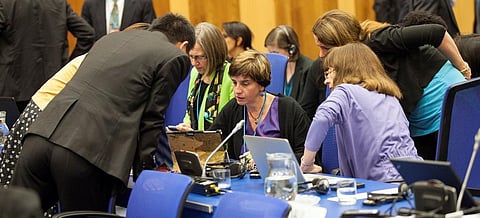

Parties to the Montreal Protocol were unable to achieve a consensus on an amendment on hydrofluorocarbon (HFC) phase-down in their Vienna meeting, even after 10 days of negotiations. The prospects of a deal at the next meeting, to be held in Rwanda’s Kigali, are high as solutions for all major challenges have been deliberated on. The Kigali conference will be the 28th Meeting of the Parties to the Montreal Protocol, to be held in October this year.
Even though crucial negotiations took place in the meeting, observers found it to lack transparency. Many negotiations were held in informal meetings that were out of access for observers. Access was also restricted during discussions on funding and baseline and freeze-date.
The Vienna meeting saw strong opposition by some parties on discussing four key amendment proposals as they felt that all issues were not covered in the consolidated draft. To break the impasse, countries like EU, Australia, Canada, Japan, New Zealand, Norway, Switzerland and USA came together and proposed a new baseline, freeze date and a reduction schedule. However, negotiators from the Middle East, India and China strongly opposed the new proposal as it put most of the transition burden on developing countries.
Baseline is the consumption cap below which the phase-down steps are determined. It plays an important role in deciding the consumption trajectory as well as cumulative consumption over the phase-down period.
The opposing countries then submitted six proposals for baseline and freeze-date for developing countries (A5 countries) and two proposals for developed countries (non-A5 countries). So far, India’s proposal is the most unambitious and conservative among all, planning to start phase-down in 2031 with a baseline of 2028-2030.
|
Proponents |
Proposed range (HFC component of baseline) |
Freeze date |
|
A5 baselines and freeze dates |
||
|
GCC* |
2024-2026 |
2028 |
|
China, Pakistan |
2019-2025 |
2025-2026 |
|
India |
2028 - 2030 |
2031 |
|
African Group, Pacific Island Countries, Latin America like-minded**, EU and JUSSCANNZ*** |
2017– 2019 |
2021 |
|
|
|
|
|
Malaysia, Indonesia, Brazil, Argentina, English-speaking Caribbean, Cuba |
2021-2023 |
2025 |
|
Iran |
2024 – 2027 |
2029 |
|
Non-A5 baseline, freeze date/first reduction step |
|
|
|
EU and JUSSCANNZ |
2011-2013 |
90% of baseline in 2019 |
|
Belarus and Russian Federation |
2009-2013 |
100% of baseline in 2020 |
| *Gulf Cooperation Council (GCC) - Saudi Arabia, Kuwait, the United Arab Emirates, Qatar, Bahrain, and Oman. ** Latin America like-minded - Nicaragua, El Salvador, Guatemala, Venezuela, Chile, Colombia, Honduras, Costa Rica, Mexico, Dominican Republic, Haiti, Panama, Peru, Paraguay (as a basis) ***JUSSCANNZ - Australia, Canada, Iceland, Israel, Japan, Liechtenstein, New Zealand, Norway, Switzerland, and the United States. |
||
Conference room papers (CRP) submitted by China, India, Pakistan, US and Canada will be discussed further in Rwanda. India’s CRP said that guidelines made by the Executive Committee should be finalised only after incorporating the views of parties. It is expected to be discussed in great detail in Kigali along with the papers of Pakistan, US and Canada.
With the priority on getting an agreement this year on HFC phase-down, it was recognised that a flexible approach is needed for developing countries. But there was divergence on fairness, ambitiousness, Intellectual Property Rights (IPR) and funding.
Energy efficiency emerged as an important component in the negotiations. With most countries agreeing that energy efficiency needs to be incorporated and an incentive provided, text which is expected to be discussed in Kigali might include it.
There were high expectations from the meeting in Vienna, which have only partially met, leaving a lot more for negotiations in Rwanda in October. Countries have decided to do their home work and converge ahead in intersession meetings or in an extended OEWG 38, which could take place a couple of days before the meeting in Rwanda to come up with an amendment to Montreal Protocol.